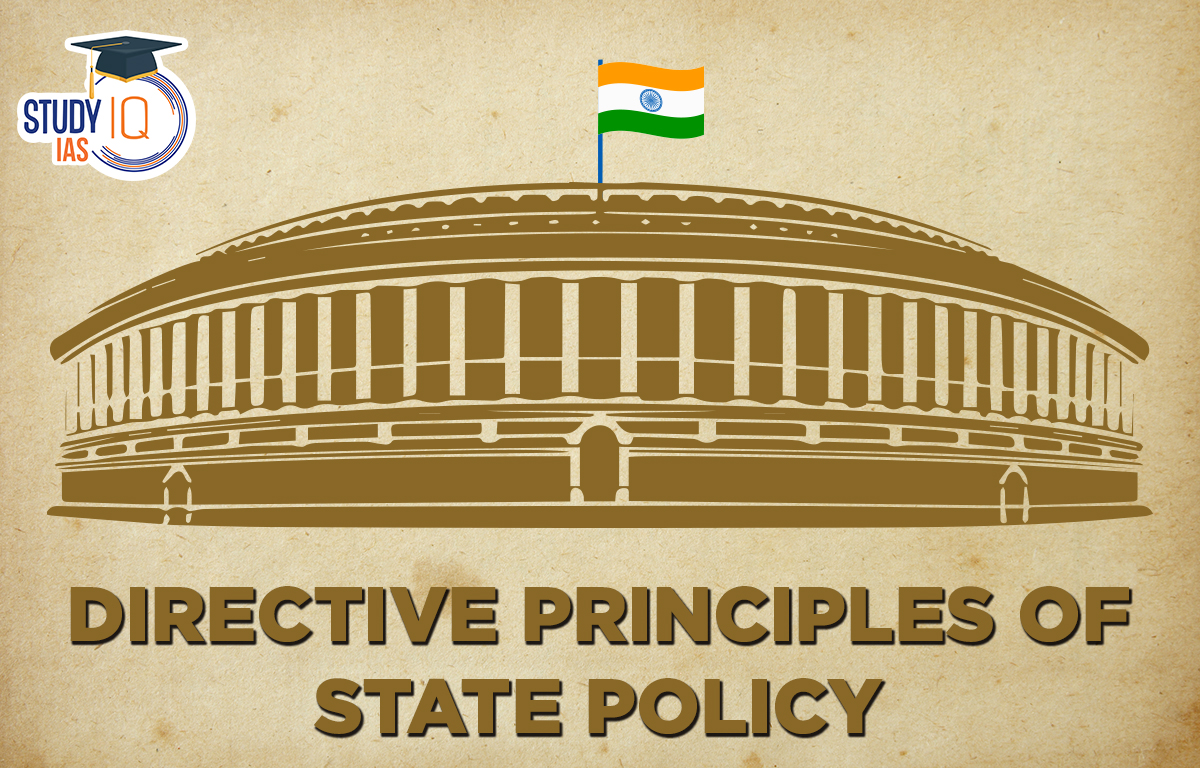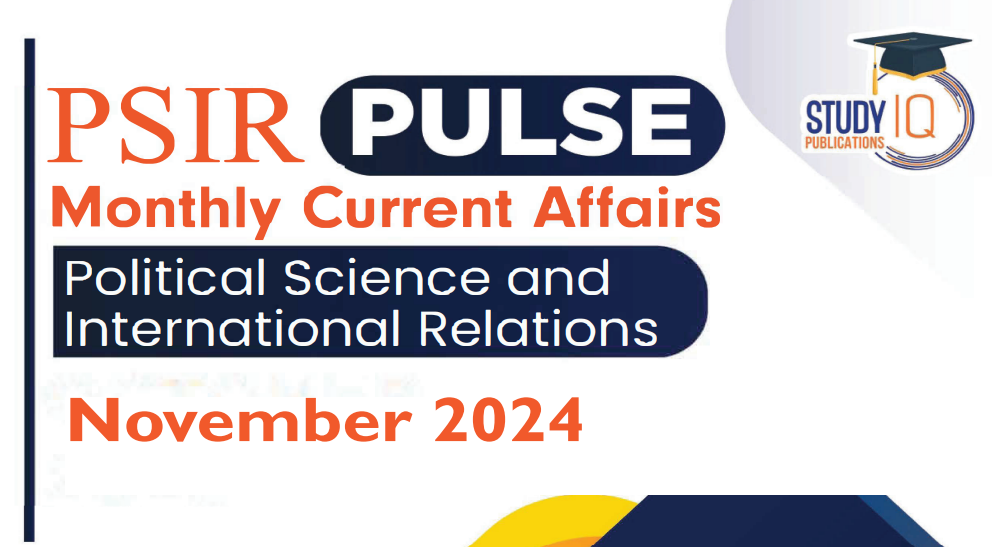Table of Contents
What is DPSP?
Articles 36-51 in Part IV of the Indian Constitution outline the Directive Principles of State Policy (DPSP), which were influenced by the Constitution of Ireland, itself inspired by the Spanish Constitution. The Sapru Committee in 1945 categorized rights into two types: justiciable rights, like Fundamental Rights, and non-justiciable rights, like the DPSP.
DPSPs are ideals that the government should consider when making policies and laws. They are described as:
- An “instrument of instructions” from the Government of India Act, 1935.
- Aiming to establish economic and social democracy in India.
- Non-enforceable by courts if violated.
Part IV of the Indian Constitution lists the Directive Principles of State Policy, popularly known as the DPSP, from Articles 36 to Article 51. The Directive Principles of State Policy, which are discussed in this article, are included in the UPSC Syllabus of Indian Polity and Governance.
Read about: Salient Features of Constitution of India
Directive Principles of State Policy History
The directives from the Government of India Act 1935 were included as Directive Principles of State Policy in the Indian Constitution in 1950. This idea was inspired by the 1937 Irish Constitution, which was influenced by the Spanish Constitution. The Directive Principles of Social Policy have greatly shaped the Directive Principles in the Indian Constitution.
Read about: Monetary Policy
DPSP Importance
The founding fathers were aware of the problems the nation had been facing, including social, economic, and political regressiveness, unemployment, poverty, and a lack of education. They outlined the principles and goals to be accomplished in the very preamble in order to abolish these ills. The goal of the constitution’s creators was to promote political, economic, and social democracy in India.
The framers agreed that the people should have access to virtually all of the current political, social, and economic rights in order to realize this cherished aim. These rights could be broadly split into two groups.
- Political and Civil Rights
- Social and Economic Rights
Political and civil rights that, in the opinion of the individual, were within his or her reach were designated as provisional Fundamental Rights, while the latter were referred to as Directive Principles of State Policy because they were deemed to be beyond the individual’s reach under the then-current conditions.
DPSP Features
Dr. B.R. Ambedkar called the Directive Principles of State Policy (DPSP) an innovative part of the Constitution. Together with Fundamental Rights, they form the Constitution’s core philosophy, which Granville Austin described as the “Conscience of the Constitution.”
The state should consider these ideals when making policies and laws. DPSP helps guide the development of economic, social, and political programs, promoting economic and social democracy. Although they can’t be enforced in court, they assist in evaluating the legality of laws.
List of Directive Principles of State Policy
Below given is the complete list of all the articles under Directive Principles of State Policy:
| Article | Meaning |
| Article 36 | Defines State as same as Article 12 unless the context otherwise defines. |
| Article 37 | Application of the Principles contained in this part. |
| Article 38 | It authorizes the state to secure a social order for the promotion of the welfare of people. |
| Article 39 | Certain principles of policies to be followed by the state. |
| Article 39A | Equal justice and free legal aid. |
| Article 40 | Organization of village panchayats. |
| Article 41 | Right to work, to education and to public assistance in certain cases. |
| Article 42 | Provision for just and humane conditions of work and maternity leaves. |
| Article 43 | Living wage etc. for workers. |
| Article 43-A | Participation of workers in management of industries. |
| Article 43-B | Promotion of cooperative societies. |
| Article 44 | Uniform civil code for the citizens. |
| Article 45 | Provision for early childhood care and education to children below the age of six years. |
| Article 46 | Promotion of education and economic interests of SC, ST, and other weaker sections. |
| Article 47 | Duty of the state to raise the level of nutrition and the standard of living and to improve public health. |
| Article 48 | Organization of agriculture and animal husbandry. |
| Article 48-A | Protection and improvement of environment and safeguarding of forests and wildlife. |
| Article 49 | Protection of monuments and places and objects of national importance. |
| Article 50 | Separation of judiciary from the executive. |
| Article 51 | Promotion of international peace and security. |
DPSP Classification
Although our Constitution does not expressly classify directive principles of state policy, they can be divided into three groups based on their substance and intended use, as follows:
- Socialistic Principles
- Gandhian Principles
- Liberal-Intellectual Principles
1. Socialistic Principles
These ideas aim to create socioeconomic justice and support a welfare state. They look at socialism and outline a democratic socialist framework. The main goal is to reduce income, status, resource, and opportunity gaps (Article 38). Several articles guide the state, including Article 39 A, which promotes equal justice and free legal aid for the poor.
- Article 42- Provide for fair and decent working conditions and maternity leave;
- Along with numerous other articles, such as Articles 38, 39, 41, 43, and 43A, Article 47 aims to improve public health through raising people’s standards of living and nutrition.
|
DPSP: Socialistic Principles |
|
| Definition: They are the guiding ideas that pave the way for the welfare state and seek to provide social and economic fairness. There are several provisions that instruct the state to: | |
| Article 38 | Ensure social order through social, economic, and political justice while minimising disparities in wealth, status, access to resources, and opportunity to better one’s lot in life. |
| Article 39 | Equal pay for equal work for men and women; protection of the health and strength of workers and children against forcible abuse; opportunities for the healthy development of children; the right to an adequate standard of living for all citizens; an equitable distribution of the community’s material resources for the good of all; and the prevention of concentration of wealth and production. |
| Article 39A | Promote equal justice and free legal aid to the poor |
| Article 41 | Ensure citizens have the following rights in circumstances of unemployment, old age, illness, and disability: the right to work; the right to education; and the right to public assistance. |
| Article 42 | Make provisions for fair and compassionate working conditions and maternity leave. |
| Article 43 | Ensure that all workers receive a living wage, a good standard of living, and access to social and cultural opportunities. |
| Article 43A | Take action to ensure that employees are involved in the management of industries. |
| Article 47 | Raising people’s standards of living, nutrition, and nutrition, and enhancing public health |
2. Gandhian Principles
These ideas come from Gandhian principles and reflect Mahatma Gandhi’s plans for rebuilding India during the national movement. Some of his goals are included in the Directive Principles of State Policy, which guide the government through specific articles.
- Article 43: Individual or corporate promotion of cottage businesses in rural areas;
- Article 47: Prohibits the use of medicines and alcoholic beverages that are harmful to health;
- Article 48: Articles 40, 43B, and 46 prohibit the slaughter of cows, calves, and other milch and draught animals and work to enhance their breeds.
|
DPSP: Gandhian Principles |
|
| Definition: These ideas, which serve as a representation of Gandhi’s reconstruction plan put forth during the national struggle, are based on Gandhian ideology. There are several articles that instruct the state to: | |
| Article 40 | Establish village panchayats and give them the necessary authority and abilities to function as self-governing entities. |
| Article 43 | Promote cottage industry in rural areas on an individual or cooperative basis. |
| Article 43B | Encourage the establishment of cooperative organisations that operate independently, democratically, and with professional management. |
| Article 46 | Promote the economic and educational goals of SCs, STs, and other marginalised groups in order to safeguard them against social injustice and exploitation. |
| Article 47 | Impose restrictions on the use of harmful substances and alcoholic beverages. |
| Article 48 | preventing the slaughter of cows, calves, and other milch and draught animals while also attempting to improve the breeds |
3. Liberal-Intellectual Principles
These beliefs reflect the ideas of liberalism. They give the state specific guidelines in different articles. For example, Article 44 calls for a “uniform civil code” for all citizens.
Other examples include:
- Article 48: Organize agriculture and animal husbandry using modern science.
- Article 48A:
- Article 49:
- Article 50:
- Article 51: Provide early childhood care and education for all children until they are six years old.
|
DPSP – Liberal-Intellectual Principles |
|
| Definition: These beliefs are a reflection of liberalism’s philosophy. There are several articles that instruct the state to: | |
| Article 44 | Ensure a standard civil code for all citizens across the nation. |
| Article 45 | All children should get early childhood care and instruction up until the age of six. (Note: The 86th Amendment Act of 2002 changed the focus of this article and included primary education to Article 21 A’s list of fundamental rights.) |
| Article 48 | Establish a sophisticated, scientific system of animal husbandry and agriculture. |
| Article 49 | the preservation of landmarks, locations, and historic or cultural objects that have been designated as being of national significance |
| Article 50 | Separate the executive branch of government from the judicial branch in state public services |
| Article 51 | Encourage the use of arbitration to resolve international disputes; Foster respect for international law and treaty obligations; Maintain just and honourable relations between nations. |
DPSPs added by 42nd Amendment 1976
42nd Amendment added four new directive Principles:
| New DPSPs | |
| Article 39 | To secure opportunities for the healthy development of children |
| Article 39A | To promote equal justice and to provide free legal aid to the poor |
| Article 43A | To take steps to secure the participation of workers in the management of industries |
| Article 48A | To protect and improve the environment and to safeguard forests and wildlife |
DPSP Implementation
A new provision, Article 21-A, was added to the Constitution as part of the 86th constitutional amendment in 2002. It aims to provide all children between the ages of 6 and 14 with free and mandatory education. The Right to Education (RTE) is currently in effect as well.
Both the federal and state governments are implementing welfare programs for the less fortunate. The Prevention of Atrocities Act, 1989 was passed by the government to safeguard scheduled castes and scheduled tribes from atrocities and prescribed harsh penalties for such atrocities.
The Minimum Salaries Act of 1948 gives the government the authority to set minimum wages for workers in a variety of professions. Equal compensation for equal work is guaranteed under the Equal Remuneration Act of 1976 for both men and women.
The Constitution’s 73rd and 74th Amendments provide (1991 & 1992 respectively). Since receiving constitutional status and additional authority, Panchayati Raj has expanded to nearly all states and Union Territories. In all criminal proceedings, legal help at the state’s expense must be provided if the defendant cannot afford to hire an attorney.
All States and Union Territories, with the exception of Jammu and Kashmir and Nagaland, have established judicial-executive separation. The DPSP has had some effect on Indian foreign policy as well. India has previously denounced all acts of violence and supported the UN’s peacekeeping missions. India has supported nuclear disarmament as well.
DPSP Criticism
The critics said that these directions lack legal authority when they are put into practice. There is no legal recourse for the infringement of these standards. They are only assertions of intentions that the State should carry out; the Constitution neither makes them justiciable nor specifies a deadline for securing them. They are “a cheque payable by the bank at its convenience,” says critic T. Shah.”
The DPSP is not entirely clear. For instance, the Directive Principle, which aims to foster world peace and amicable cooperation among all nations, lacks clear implementation requirements.
Some of the principles lack applicability. Some of the recommendations in Part IV cannot be put into practice in the real world. Prohibition was instituted in Haryana, but it proved to be nearly impossible to carry out. As a result, the Haryana Government was forced to abandon it. Due of the practical challenges associated with implementing prohibition, legislation cannot be used to enforce prohibition.
Due to its inclusion of ancient and foreign intellectual underpinnings built around Fabian Socialist, which nearly lost all relevance in the modern world, Directive Principles is being questioned. Many detractors believe that their listing in Part IV has made matters more difficult to understand because the Preamble of Indian Constitution makes explicit the ideals outlined here. Directive principles are intended to act as pious vows to convey the idea of the reasonable and beneficial use of political power. By making promises rather than taking action, they hope to gain support.


 One Nation One Election, Advantages and ...
One Nation One Election, Advantages and ...
 Removal Of Vice President of India
Removal Of Vice President of India
 Oilfields Amendment Bill 2024, Key Amend...
Oilfields Amendment Bill 2024, Key Amend...




















